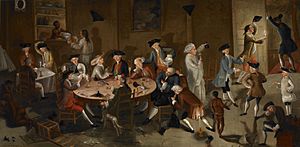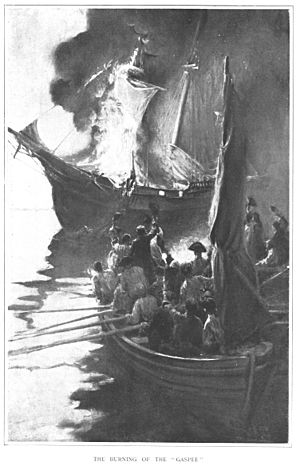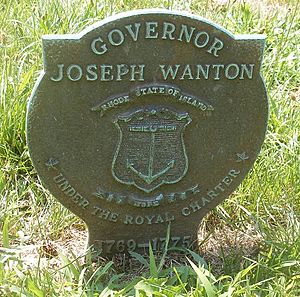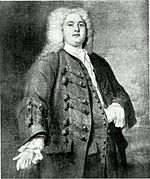Joseph Wanton facts for kids
Quick facts for kids
Joseph Wanton Sr.
|
|
|---|---|
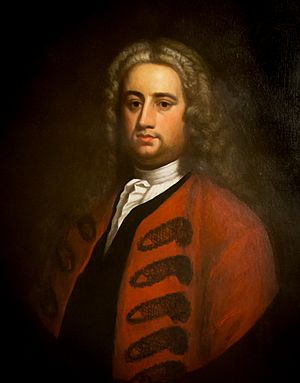
Joseph Wanton
|
|
| 36th Governor of the Colony of Rhode Island and Providence Plantations | |
| In office 1769–1775 |
|
| Preceded by | Josias Lyndon |
| Succeeded by | Nicholas Cooke |
| Personal details | |
| Born | 15 August 1705 Newport, Rhode Island |
| Died | July 19, 1780 (aged 74) |
| Resting place | Clifton Burying Ground, Newport |
| Spouse | Mary Winthrop |
| Occupation | Merchant, governor |
| Signature | |
Joseph Wanton Sr. (born August 15, 1705 – died July 19, 1780) was a successful merchant and governor in the Colony of Rhode Island and Providence Plantations. He served as governor from 1769 to 1775. As the American Revolutionary War approached, Wanton preferred to stay neutral and avoid conflict with Britain. Because of this, some people called him a Loyalist, but he was not actively against the American cause. He lived peacefully during the war, and his property was not harmed.
Wanton was born in Newport into a well-known Quaker family that was very active in Rhode Island politics. He became a very successful merchant, trading in many goods, including slaves. He is shown in a funny painting from the 1750s by John Greenwood, called Sea Captains Carousing in Surinam. This painting shows him with other important merchants and sailors from the colony.
Even without much political experience, Wanton was elected governor in 1769 and served for six years. During his time as governor, many important events happened as the American Revolutionary War got closer. One major event was the Gaspee Affair in 1772. Wanton played a key role in stopping the British from finding the colonists who burned the royal ship Gaspee. The Continental Congress was also formed during his time as governor, and he often communicated with leaders from other colonies. He also helped start a new college in Rhode Island, which later became Brown University.
As the Revolutionary War grew closer, many members of the General Assembly wanted to fight. When Wanton was elected governor for the seventh time in 1775, he refused to approve raising an army of 1500 men. He also would not officially appoint new military officers. Because of this, the Assembly would not let him serve as governor and removed him from office a few months later. Nicholas Cooke then took his place. Wanton believed that a war with Great Britain was not good for the colony. He went back to his home in Newport and was not bothered during the war. He passed away in 1780, before the war ended.
Contents
Joseph Wanton's Early Life
Joseph Wanton was born in Newport, in the Colony of Rhode Island and Providence Plantations, on August 15, 1705. He was the seventh of nine children. His father, William Wanton, had been a governor of the colony. His uncle, John Wanton, and his older cousin, Gideon Wanton, also served as governors.
His grandfather, Edward Wanton, was a ship builder who became a Quaker. He became a Quaker after seeing how these people were treated. Joseph Wanton's mother was Presbyterian, so his parents decided to raise their children in the Anglican faith.
Some records say Joseph Wanton graduated from Harvard College in 1751. However, it is more likely that his 21-year-old son, Joseph Wanton Jr., graduated then, as Joseph Sr. was already 46 and a very successful merchant. We know he was well-educated because of the many letters he wrote, especially as governor.
In the mid-1750s, a painter named John Greenwood traveled with a group of sea captains and merchants to Surinam in South America. These men often waited in pubs while their goods were traded. The merchants asked Greenwood to create a funny painting. He made a scene with 22 figures in a tavern, including himself and the wealthy traders. Most people agree that Wanton is the bald man resting in a chair by the table.
As a merchant, Wanton was involved in trading many different goods by sea. In 1758, Wanton stated that his ship, the Snow King of Prussia, was carrying rum and 54 slaves. While anchored off the coast of Africa, a French privateer captured his ship and its cargo.
In 1765, Wanton helped start a new college in Rhode Island. It was first called the College in the English Colony of Rhode Island and Providence Plantations. Later, it was named Brown University. He was listed as one of the original founders and a trustee of the college.
Joseph Wanton's Time as Governor
There is no record that Joseph Wanton held any major public office before he was elected governor in May 1769. After becoming governor, his first action was to write a letter to Lord Hillsborough, the Colonial Secretary of State. In his letter, Wanton bravely stated that he could not follow the crown's orders if they went against the colony's constitution. He also said that the British Parliament, where the colonists had no say, was wrong to tax them without their agreement.
Tensions grew among the American colonists because of things like the Stamp Act. In July 1769, a British ship called Liberty brought two Connecticut ships, suspected of smuggling, into Newport harbor. When problems arose, the captain of one of the Connecticut ships was shot at from the Liberty. That evening, some Newport citizens, angry about the seizure of the ships, boarded the Liberty and sank it. The two captured ships then sailed away. This was the first open act of violence by the colonies against Great Britain. Wanton announced a reward for the arrest of those responsible, but no one was ever arrested.
The Gaspee Affair
In March 1772, the people of the colony were bothered by the British ship Gaspee. This ship, with eight guns, was in Narragansett Bay to enforce tax laws. Its commander, Lieutenant William Dudingston, often stopped vessels without reason and sometimes stole from people on shore. He also broke the colony's charter by acting without showing his official papers.
The people of Providence complained to Deputy Governor Darius Sessions. Sessions spoke with Chief Justice Stephen Hopkins, who said that no ship commander had the right to act in the colony without first asking the governor and showing their official papers. Sessions then told Governor Wanton about the complaints. Wanton immediately sent a letter to Dudingston, asking him to show his official papers. Dudingston sent a rude reply. Wanton wrote back, repeating his demand and promising Dudingston safety if he came ashore.
Dudingston then sent the letters to his superior officer, Admiral Montagu, in Boston. Montagu supported Dudingston and sent a very insulting letter to Wanton. He defended Dudingston and made fun of the governor, suggesting that those who interfered with the crown's activities could "hang as pirates." Wanton then told Montagu, "I do not receive instructions for the administration of my government from the King's Admiral stationed in America." He showed all the letters to the General Assembly and sent copies to England. Wanton also wrote to Lord Hillsborough, complaining about Montagu's rudeness and detailing the Gaspee's behavior.
On June 8, 1772, a ship called the Hannah arrived in Newport from New York. The next day, it sailed up the river. The Gaspee chased it, as it often did, but ran aground near Pawtuxet. The Hannah escaped to Providence. That evening, men were called to James Sabin's house to plan an attack on the Gaspee. John Brown provided eight long-boats, and shortly after 10 p.m., the group headed towards the Gaspee. Captain Abraham Whipple led them.
After midnight, the group approached the ship. When the ship's guard called out, they did not answer. Dudingston himself called out again, still with no answer. Whipple then swore and ordered his men to row faster. Shots were fired from both sides. A musket ball hit Dudingston in the leg. As he fell, the attackers boarded the ship and took it over. The ship's crew was tied up and put ashore. Dr. John Mawney took care of Dudingston. This was a major moment: it was the first British blood spilled in the American War for Independence. After removing the crew, the attackers set the ship on fire and returned to Providence.
A crew member sent a report to Montagu, who then sent a copy to Wanton, asking him to arrest the attackers. Wanton then issued a statement, offering a 100-pound reward for information leading to their conviction. Many letters were exchanged between Wanton, the Admiral, and Lieutenant Dudingston. An escaped slave who was with the attackers gave some names to Admiral Montagu. Montagu sent this information to Wanton, asking for the people to be questioned. Instead of following this request, Wanton took statements that made the slave's testimony seem unreliable.
When the news reached England, King George III offered a reward of £1000 for each leader of the attack and £500 for each other person involved. Wanton, along with others from nearby colonies, was asked to investigate the facts. The people who attacked the Gaspee were well-known and important citizens of the colony. Some of the younger ones had even openly bragged about what happened while the ship was still burning. Wanton and other Rhode Island leaders successfully slowed down the investigations. Despite all the communications and claims, the court could not find enough direct evidence to charge anyone.
Moving Towards War
During Wanton's time as governor, the people of Providence asked the General Assembly to stop the import of black slaves into the colony. They also wanted black slaves born in the colony to be freed at a certain age. These ideas were partly adopted by the Assembly. In early 1773, a movement to unite the colonies began. Resolutions were passed to appoint committees to communicate between colonies. In May 1774, the first clear step towards a Continental Congress was made in Providence. Within a few weeks, delegates were chosen to attend. All but one of the 13 colonies sent representatives, with Rhode Island's delegates being Stephen Hopkins and Samuel Ward.
On April 19, 1775, the Battle of Lexington marked the start of the long-expected war between the colonies and Britain. Three days later, the Rhode Island General Assembly, which supported Massachusetts, passed a law to raise 1500 men for an army. This army was ready to help any other colony. On April 25, Governor Wanton, Deputy Governor Darius Sessions, and two others signed a protest against raising an army. They believed it would harm their colony's special rights and lead to a civil war.
Wanton's Removal from Office
At the May 1775 meeting of the Assembly, Wanton was elected governor for his seventh term. However, Nicholas Cooke replaced Sessions as deputy governor. The Assembly listed several complaints against Wanton. These included his protest against raising an army, his refusal to appoint officers for the troops, and his failure to attend the Assembly and take his oath of office. Wanton sent a calm reply, but he continued to oppose the army and the appointments.
This was not enough for the patriots in the General Assembly. At the June meeting, Wanton was removed from office without a formal trial. He was officially removed in November, and Deputy Governor Cooke took over his duties until the next election.
While some people strongly criticized Wanton and called him a loyalist, he had real concerns about going to war with Britain. He lived in Newport, which was the wealthiest town of its size in the colonies. A war with the British government would likely cause the town to lose its wealth and social standing. It was also likely that the town would be taken over and damaged. On May 2, 1775, Wanton wrote in a letter, "The success and happiness of this colony depend on its connection with Great Britain."
After being removed from office, Wanton lived a quiet life. He remained strictly neutral, not helping or harming the British side. Neither he nor his property was disturbed. He passed away in 1780 and was buried in the Clifton Burying Ground, where several other Quaker governors are buried.
Joseph Wanton's Family
Joseph Wanton married Mary, the daughter of John Still Winthrop from New London. Mary was the great-granddaughter of Connecticut colonial Governor, John Winthrop Jr., and a great-great-granddaughter of Massachusetts colonial Governor and Boston founder John Winthrop.
They had eight children. Their oldest son, Joseph Wanton Jr., served as deputy governor of the colony for two terms. However, he was openly a Loyalist, and his property in Newport was taken after the British left Newport. While Joseph Wanton Sr. stayed neutral during the war, his feelings leaned towards the British. Not only was his son a Loyalist, but several of his daughters married important British officials.
 | Charles R. Drew |
 | Benjamin Banneker |
 | Jane C. Wright |
 | Roger Arliner Young |


